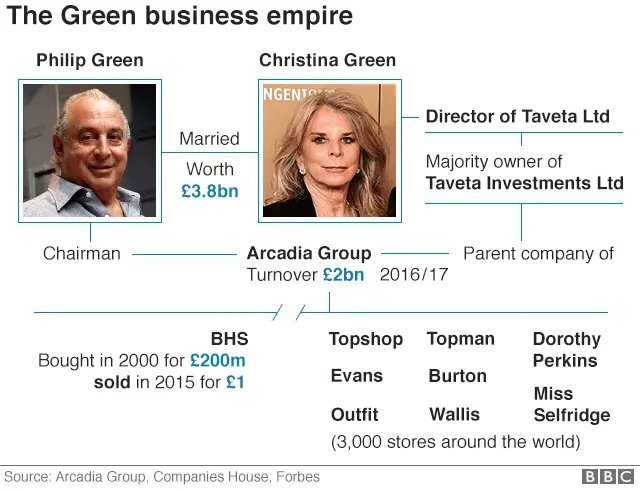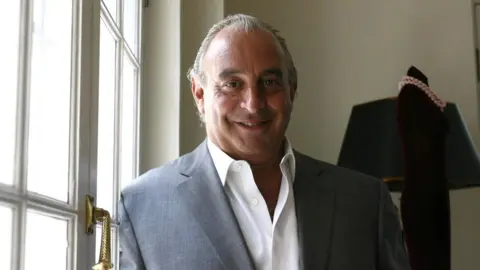Lord Hain branded 'arrogant' for naming Sir Philip Green
Naming Sir Philip Green as the man who prevented a newspaper publishing allegations of sexual and racial harassment was "arrogant", former Attorney General Dominic Grieve says.
Mr Grieve told the BBC that Lord Hain undermined the rule of law and "abused" his parliamentary privilege.
Lord Hain defended revealing the name, saying he had received "overwhelming support - particularly from women".
Sir Philip says he "categorically and wholly" denies the allegations.
The BBC's Emma Simpson spoke to one former top executive who said he was "genuinely shocked" at the allegations.
The executive said he had never heard or seen a hint of any sexual harassment or racial abuse - but he said Sir Philip could be "very, very aggressive" and "rude to everyone".
'Political witch hunt'
The Daily Telegraph first reported on the injunction on Wednesday, saying a "leading businessman" had won a legal battle to stop the newspaper printing "confidential information" from five employees.
It has now written to Sir Philip's lawyers, asking him to drop the injunction as he has now issued a statement himself and the whole matter has had "very wide coverage".
 Getty Images
Getty ImagesThis would allow reporters at the Telegraph to publish allegations from those who entered non-disclosure agreements. The newspaper has said "substantial sums" were paid to five members of Sir Philip's staff in settlement agreements which included a legal commitment not to discuss their alleged experiences.
NDAs: What are non-disclosure agreements?
Lord Hain identified the retail tycoon on Thursday using parliamentary privilege, which protects MPs and peers from being prosecuted for libel over statements made in the Commons or Lords.
But former Lord Chief Justice and life peer Baron Judge said he was "disappointed" in Lord Hain's decision and said he thought "he was wrong".
He added: "The consequences are so serious. Whatever we think of Sir Philip... he's entitled to go to a court as much as anybody else."
He believes Parliamentary code of practice should be looked at to make it "categorically clear" that a member of Parliament should not use their privilege to "interfere with the processes of the court and the administration of justice".
It has since emerged the peer is a global and government adviser at Gordon Dadds, the law firm used by the Telegraph.
In a statement, Gordon Dadds said Lord Hain had not obtained any information from them regarding the case, "including any information which would enable him to identify Philip Green as having any involvement in it".
Lord Hain "categorically" denied that he was aware of the law firm's work with the Telegraph and said the firm played "absolutely no part" in his decision to name Sir Philip.
Mr Grieve told BBC Radio 4's World at One: "We can't operate a democratic free society when peers or MPs decide to take the law into their own hands."
The legal process has been turned into "what looks like a political witch hunt", he added.
The injunction against the Telegraph was only an interim one, and judges had not even made their final decision before Lord Hain intervened, he said.
Parliamentary privilege is "very important" but "open to abuse", said Mr Grieve, adding: "I can't see - looking at this particular matter - that Peter Hain can argue that he hasn't abused it."
Meanwhile, pledges to boycott Sir Philip's stores, including Topshop, have been made on social media .
The Telegraph says it spent eight months investigating allegations of bullying, intimidation and sexual harassment.
After he was contacted for comment in July, Sir Philip and a number of senior staff applied for an injunction to stop details being published, the Telegraph said.
A High Court judge refused to grant the gagging order the following month, but Appeal Court judges ruled in Sir Philip's favour on Tuesday this week.
The BBC has not been able to verify the allegations contained in the Telegraph's report.
While the Court of Appeal's temporary order banning the naming of Sir Philip remains in force, Lord Hain told the House of Lords he "felt it was his duty" to identify the Topshop boss and that it was in the public interest.
The former Neath MP said he had been contacted by someone "intimately involved in the case" and, given the use of non-disclosure agreements (NDAs) "to conceal the truth about serious and repeated sexual harassment, racist abuse and bullying", he felt he should speak out.

Speaking later on BBC Newsnight, Lord Hain denied he was undermining a decision of the courts, saying: "I considered it extremely seriously before I said it."
"I'm not disputing judges' responsibilities or timing or anything like that. That's a matter for the judiciary," he said.
"I'm discharging my function as a parliamentarian - and what concerned me about this case was wealth, and power that comes with it, and abuse."
Labour MP Jess Phillips said Lord Hain was right to name Sir Philip, adding: "I think that he wouldn't have taken the decision lightly at all. Parliamentary privilege is used in vanishingly rare situations."
 Getty Images
Getty ImagesThere have been calls for Arcadia chairman Sir Philip to lose his knighthood if the allegations are proved to be correct, from MPs including Liberal Democrat leader Sir Vince Cable.
And Birkenhead MP Frank Field, who led condemnation of Sir Philip over the BHS pension fund scandal, said: "The charge sheet against the knighthood is growing."
Prime Minister Theresa May's official spokeswoman said the Honours Forfeiture Committee, which would decide on such a matter, is independent of government and "constantly reviewing evidence in relation to matters like this".
She added that Mrs May has been clear on the wider issue that "bullying and sexual harassment in the workplace is against the law and that kind of behaviour can't be tolerated".
 PA
PASir Philip said in a statement on Thursday night that he would not comment on anything that happened in court or was said in Parliament.
"To the extent that it is suggested that I have been guilty of unlawful sexual or racist behaviour, I categorically and wholly deny these allegations," he said.
Sir Philip said he and his company, Arcadia, "take accusations and grievances from employees very seriously and in the event that one is raised, it is thoroughly investigated.
"Arcadia employs more than 20,000 people and in common with many large businesses sometimes receives formal complaints from employees.
"In some cases these are settled with the agreement of all parties and their legal advisers. These settlements are confidential so I cannot comment further on them."
